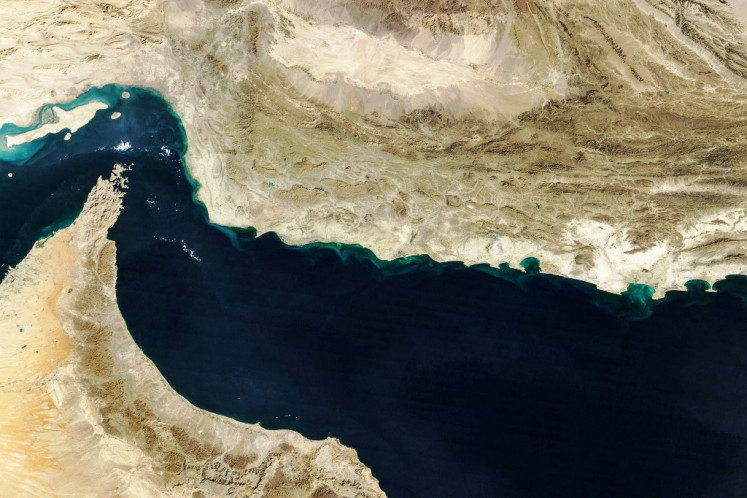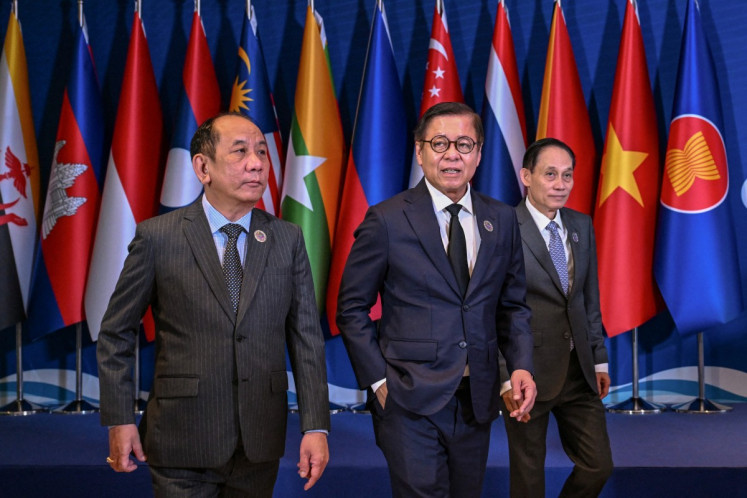Popular Reads
Top Results
Can't find what you're looking for?
View all search resultsPopular Reads
Top Results
Can't find what you're looking for?
View all search resultsOur role in a divided world
The best course of action for Indonesia is to stay out of it when the US and China vie for influence.
Change text size
Gift Premium Articles
to Anyone
T
his year’s Annual International Forum on Economic Development and Public Policy (AIFED), held in Bali from Dec. 6 to 7, carried the theme “The Fragmented World: Recalibrating Development Strategies".
The topic is timely, for the further the world splits into two economic blocks, one dominated by the United States and the other by China, the harder it will become to work together across the globe and tackle existential threats to humanity.
That urgency was reflected in Indonesian Finance Minister Sri Mulyani Indrawati’s opening remarks to the AIFED, where she noted that countries had resorted to an unprecedented use of monetary and fiscal tools to protect their economies.
A case in point is the US Inflation Reduction Act (IRA), which gives enormous rewards to US-based companies in a range of sectors, particularly but not limited to energy. Another is the CHIPS and Science Act, which aims to boost US-based semiconductor producers and connected industries.
Both of those pieces of legislation are aimed at revitalizing US manufacturing through state support, and both have massive implications for global trade and investment streams, often to the detriment of other countries.
The US is not alone in pursuing an increasingly protectionist stance. Other countries are also undermining the principle of free trade, a principle that has contributed to global prosperity for centuries.
But the sheer amount of funds it can muster gives Washington a head start in what is essentially a worldwide subsidy race. China has the scale and resources to take countermeasures to US action, much of which is aimed squarely at getting a leg up on Beijing.
Other developed economies, notably Germany, have also begun to roll out the big guns when it comes to investment incentives, sparing tens of billions of euros for coveted industries like chipmaking.
Emerging and developing economies like Indonesia do not have the wherewithal to play that zero-sum game. What Jakarta can do, and is doing, is use trade policies to push domestic industrial development.
And who could blame it for looking out for its own interests, given that everyone else is doing the same, while an impotent World Trade Organization is standing by bashfully, watching it all unfold.
Subsidies and sanctions can distort global trade and investment just as much as curbs to imports or exports, and just like the latter, they usually cause a misallocation of resources in that products or services are not produced where it is most cost-efficient to do so.
As a geopolitical lightweight with a less developed economy, Indonesia would be better off in a world where the WTO lived up to its name and prohibited unilateral trade and investment policies.
Alas, that is not the world we live in. The world we live in is one of technology wars, geopolitical fragmentation and America First, in every country.
The best course of action for Indonesia in that world is to stay out of it when the US and China vie for influence. What might sound like a passive strategy is anything but.
Not taking sides is easier said than done when countries are inclined to demand political allegiance in return for economic cooperation. Remaining neutral in such a world requires conscious effort, and such is reflected in Jakarta’s doctrine of a “free and active” – not passive – foreign policy.
An argument often heard is that Indonesia stands to benefit as manufacturers based in Beijing look for a presence in other markets of the region in what has been termed the China Plus One strategy.
Whether that is true remains to be seen. It might also just lead to economic fragmentation or a subsidy race within the region.
While multilateralism is under threat, Indonesia can still pursue an economic policy guided by common principles and promote that policy in its sphere of influence, ASEAN.
Whoever wins the presidential election in February should remain committed to Indonesia’s non-aligned economic policy.











